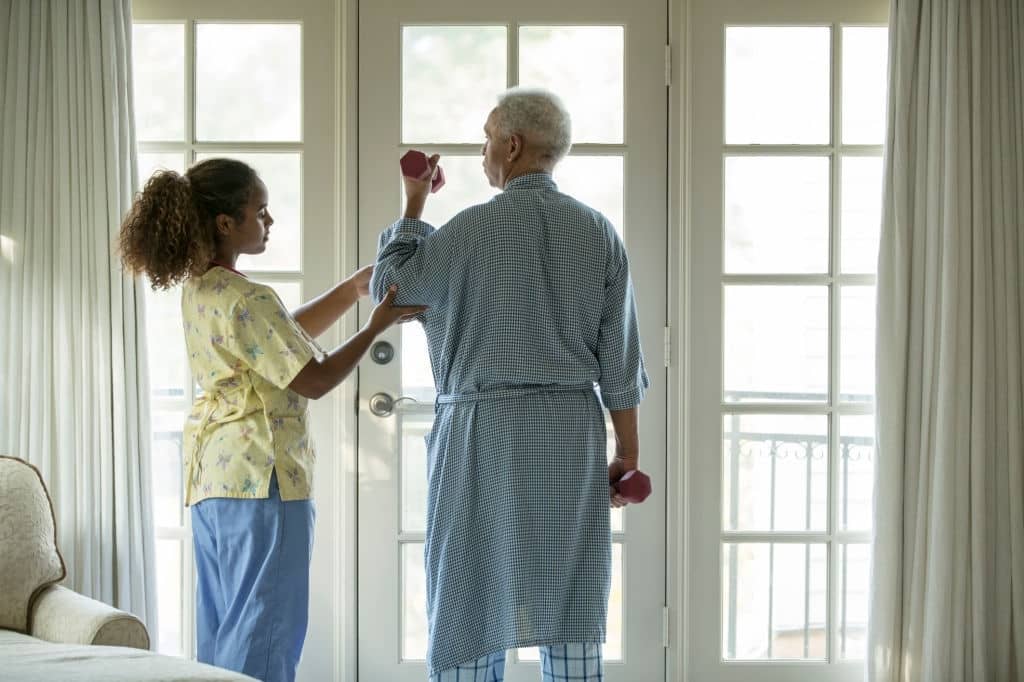
The Role Of Occupational Therapy in Senior Home Care
You may have heard the term “occupational therapy” before but are not entirely sure what it entails. Or, maybe you have never heard of it before and wonder what an occupational therapist does. Either way, it’s essential to understand this profession and why it can be beneficial for you or a loved one.
Today’s post will focus on the advantages of occupational therapy and why home care and occupational therapy in Miami are valuable and important to understand.
What is occupational therapy?
The American Occupational Therapy Association describes that “occupational therapists and occupational therapy assistants help people across the lifespan participate in the things they want and need to do through the therapeutic use of everyday activities (occupations)”.
Occupational therapy has been around for several decades to help home-based individuals with disabilities and elderly patients lead more productive lives. This includes both vocational rehabilitation and performance improvement activities, which are used to help people recover, improve or maintain health, develop skills required for daily living and employment.
People who have experienced a life event that resulted in an injury or decrease in ability could benefit from occupational therapy. For example, if you broke your ankle and had to wear a cast for several weeks, this would be considered a “disability” during the healing process. As part of rehabilitation, you may visit an occupational therapist to build up strength and balance so you can perform your daily activities in more efficient ways.
What role does occupational therapy play in senior home care?
Occupational therapy is used in senior home care as well. As people age, they are more prone to injury or illness that could affect their independence and life at home. Occupational therapy could be beneficial for seniors who have long-term health conditions, but may not need an overnight stay in a skilled nursing facility.
It is often viewed as an “add-on” to home care. Many people who are caring for a loved one at home will hire the services of a home health aide or personal assistant to provide more structure and monitoring throughout their day. This may be helpful in the short term, but sometimes what people really need is long-term care and assistance at home.
Occupational therapists provide this, with personalized therapy according to client needs that focus on daily routines and living conditions. These may include activities such as cooking, eating, bathing, dressing, and household chores.
The following are a few of the main roles that occupational therapy can play in a senior’s life:
1) Helps with pain management
Through therapeutic exercises or modifications to daily routines, occupational therapists can help individuals cope with pain, whether it is short-term or chronic. By providing assistance and alternate methods, occupational therapists can prevent patients from overextending themselves without sacrificing their quality of life. They can also help seniors develop coping skills that will allow them to self-manage pain.
2) Promotes a safe, risk-free environment that is conducive to healing
Occupational therapists consider an individual’s needs when they are assessing seniors’ homes. They observe the resident’s level of function, mental status, and available support systems to make recommendations on changes that need to be made in order for them to live safely in their home environment.
3) Addresses concerns related to productivity and performance of desired daily tasks
For seniors who are unable to engage in the activities they enjoyed before aging, occupational therapists can help them find new ways to participate. They can assist individuals with engaging in activities around the house and running errands, which allows them to maintain a sense of self-worth and feel productive.
4) Enhances independence at home by teaching people new ways of completing tasks
Occupational therapists are concerned primarily with helping people help themselves, and often teach individuals new ways of completing tasks. For example, they can show seniors how to use adaptive equipment when bathing, preparing meals, and cleaning the house.
Independence is important for elderly patients for many reasons. It makes them feel good about themselves and gives them a sense that they have control over how they live. In one study, conducted by Health Age International, almost every older individual stated that retaining autonomy was the most essential thing to them.
5) Assists in re-engaging a person to the community and surrounding environment through participation and independence
Occupational therapists are involved in helping individuals find ways to engage in meaningful activities by targeting their abilities and limitations, rather than their disabilities. Given enough time, this will allow patients to regain the confidence not only to perform their everyday tasks, but also to re-engage in personal hobbies, community events, or games.
6) Increases the individual’s sense of self-worth
Many senior citizens can struggle with feelings of worthlessness or depression as a result of their decreased ability to perform certain tasks. Studies by the Centers for Disease Control and Prevention (CDC) estimate that 7 million American adults over the age of 65 experience depression each year.
It is the role of occupational therapists to work with patients in order to help them re-engage in daily activities that make them feel useful or provide a sense of accomplishment, which can greatly improve their mental health and overall well-being. Occupational therapists assist patients in identifying their strengths and weaknesses and therefore work to create a healthy self-perception. By teaching individuals new skills or abilities that they can be proud of, OTs help seniors feel like themselves again and continue on with daily routines confidently.
Conclusion
The advantages of occupational therapy in senior home care show that it is essential to include in your senior health care plans. Occupational therapists address concerns related to productivity and performance of desired daily tasks, self-reliance, re-engagement in the community, independence at home, and an overall sense of well-being.
As always, you should consult with your doctor before providing additional services to a loved one. If you are looking for home care and occupational therapy in Miami, Florida, or want to learn more about the services we provide, contact 24/7 Home HealthCare today. We offer flexible live-in and hourly caregiving services for people who may need a little more help at home.




